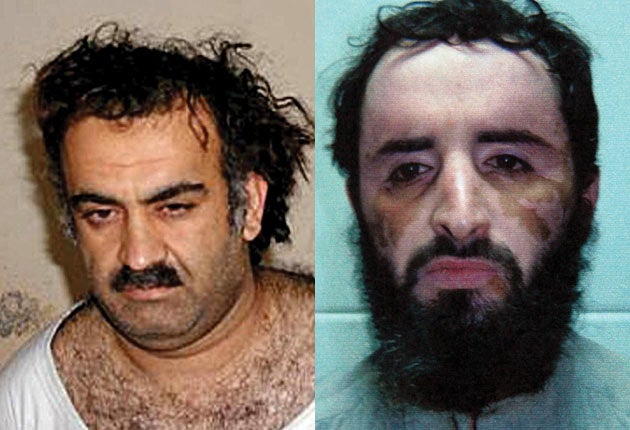Kim Sengupta: Bin Laden's death reignites debate over use of torture on detainees

Your support helps us to tell the story
From reproductive rights to climate change to Big Tech, The Independent is on the ground when the story is developing. Whether it's investigating the financials of Elon Musk's pro-Trump PAC or producing our latest documentary, 'The A Word', which shines a light on the American women fighting for reproductive rights, we know how important it is to parse out the facts from the messaging.
At such a critical moment in US history, we need reporters on the ground. Your donation allows us to keep sending journalists to speak to both sides of the story.
The Independent is trusted by Americans across the entire political spectrum. And unlike many other quality news outlets, we choose not to lock Americans out of our reporting and analysis with paywalls. We believe quality journalism should be available to everyone, paid for by those who can afford it.
Your support makes all the difference.The tracking and killing of Osama bin Laden has reignited an emotive debate going to the heart of the moral compass of the "War on Terror" with former members of the Bush administration claiming that it vindicated the use of torture to obtain information.
The hunt for the founder of al-Qa'ida would not have ended in success, they insist, without measures such as waterboarding and sleep deprivation applied to senior insurgent detainees, such as Khalid Sheikh Mohammed and Abu Faraj al-Libbi.
This, it is maintained, yielded vital breakthroughs in the investigation. John Rodriguez, a past CIA head of counter-terrorism, stated: "Both Khalid Sheikh Mohammed and Mr Libbi were held at CIA black sites and subjected to enhanced interrogation techniques. Mr Libbi was not waterboarded, but his information on the courier was the key." John Yoo, a former Justice Department official, added: "President Obama can take credit, rightfully, for the success. But he owes it to the tough decisions taken by the Bush administration."
The claims, however, were immediately refuted by others with detailed knowledge of events at the time. Glenn L Carle, who, as a CIA operative had overseen the questioning of high-level prisoners, held that the mistreatment was counter-productive and "did not provide useful, meaningful, trustworthy information... everyone was deeply concerned and felt it was un-American and did not work".
Tommy Vietor, the spokesman for the National Security Council in Washington, was likewise adamant. "If we had some kind of smoking-gun intelligence from waterboarding in 2003, we would have taken bin Laden out in 2003. There is no way that information obtained by such methods was the decisive intelligence which led us to him. It took years of collection and analysis from many different sources to develop the case that enabled us to identify his compound and reach a judgment that bin Laden was likely to be living there."
The speed and vehemence with which the opposing arguments have been put forward by the two sides echo the deep divisions over the actions taken by the US over the hundreds of "enemy combatants" who ended up in Guantanamo Bay and as subjects of a "rendition" system under which they effectively disappeared into a legal "black hole" ending up in prisons where they faced sustained abuse.
Human rights groups had long campaigned against the practice and Barack Obama had repeatedly declared his opposition to the punitive mistreatment during his election campaign.
George W Bush, in his memoirs published last year, claimed that his authorisation of means such as waterboarding had saved lives on both sides of the Atlantic. British officials disputed that the technique, which would be regarded as torture and illegal by a British court, breaking Article 3 of the European Convention on Human Rights, had stopped bombings in this country.
Kim Howells, the former Labour MP who chaired the Commons Intelligence and Security Committee, said: "We are not convinced. I doubt that this, what we regard as torture, actually produced information instrumental in preventing those plots coming to fruition."
Bin Laden was traced to his place of refugee, Abbottabad, a garrison town for the Pakistani army near the country's capital, Islamabad, after US authorities began surveillance on a courier trusted and regularly used by the al-Qa'ida chief. The initial information about the conduit had come from questioning of suspects in Guantanamo Bay and eastern European prisons used in the "rendition" process. However, records show that Khalid Sheikh Mohammed, who was waterboarded 183 times, and Abu Faraj al-Libbi, who was subjected to sleep deprivation, had repeatedly misled their interrogators about the real identity of the courier. Mr Mohammed had claimed that the courier was retired and of little consequence. Mr Libbi provided a name for the man which turned out to be wrong.
Crucial details about the courier were provided, on the other hand, by Hassan Ghul, an al-Qa'ida member captured in Iraq.
Mr Ghul, however, was not waterboarded. The CIA asked the US Justice Department to authorise a number of other "enhanced techniques" in his questioning, but, according to one official, this proved largely unnecessary as using non-brutal methods, resulted in co-operation and information.
But the very fact that Mr Mohammed and Mr Libbi had attempted to steer their interrogators away from the courier was of crucial importance, according to those defending the harsh action meted out to them. This proved that the man was actually of great importance to the jihadist network.
Join our commenting forum
Join thought-provoking conversations, follow other Independent readers and see their replies
Comments